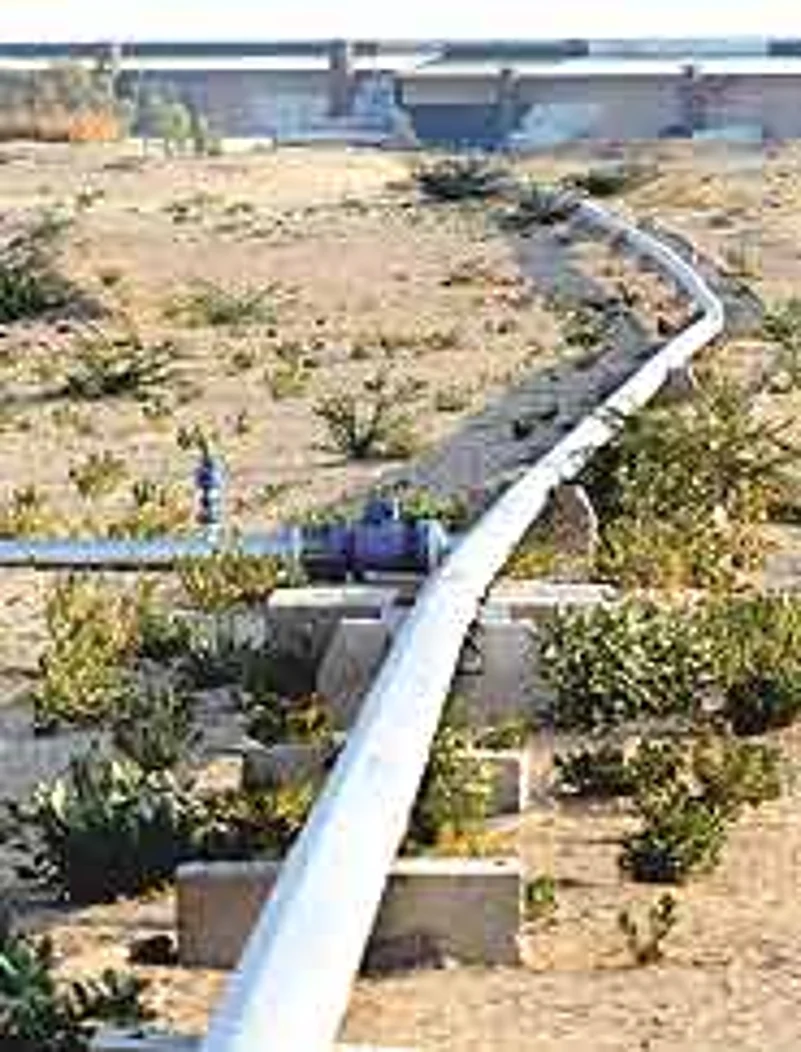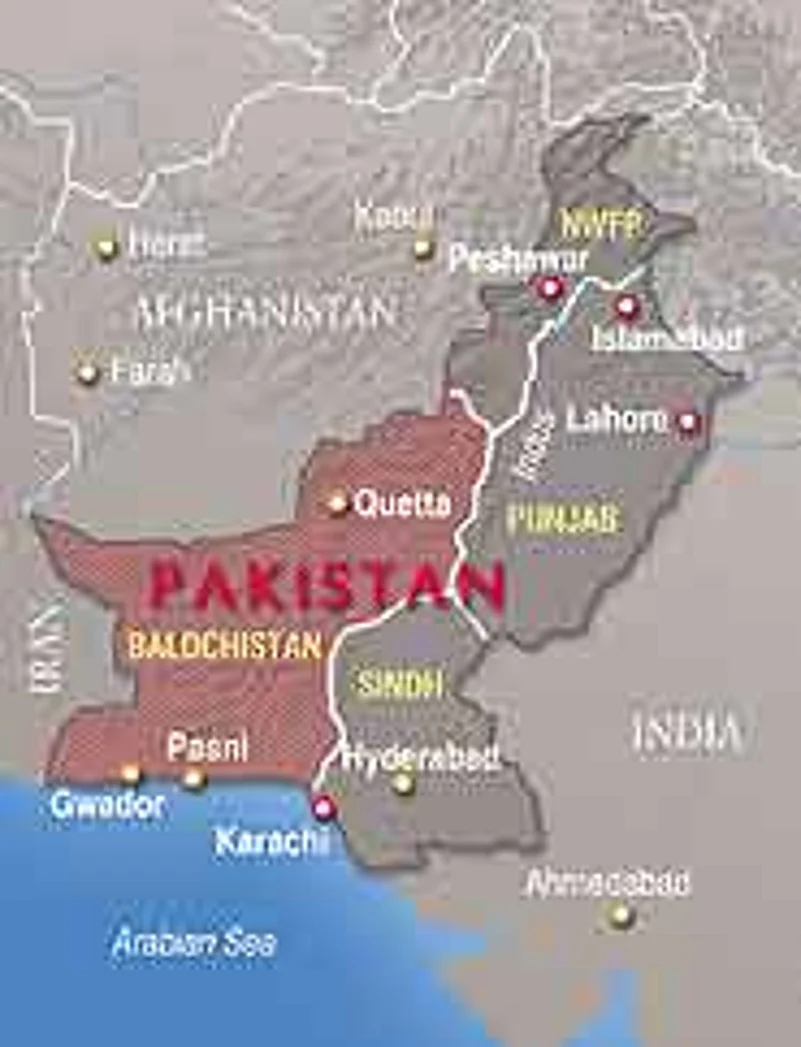Alarmed, the rulers in Islamabad turned to peer at their radar screen. And what they saw on it was that Balochistan was threatening to veer off its track. There were palpable signs of it: two dozen paratroopers had been killed, and the gas pipeline from Sui, about 480 km northeast of Karachi and which boasts of the country’s largest gas reserve, had been sabotaged. In a jiffy, thousands of army troops were ordered into Balochistan, and helicopter gunships requisitioned.
Pakistan President Pervez Musharraf appeared on GEO TV to threaten, "This isn’t the ’70s, we will not climb mountains behind them. They will not even know what has come from where to hit them." (The ’70s had seen the Balochis wage a guerrilla war.) Musharraf also said a country across the border was funnelling weapons and money to fuel unrest in Sui. He did not name India, yet people understood who he meant. Earlier, when sectarian violence had rocked Quetta, chief minister Jam Yusuf had accused India’s external espionage agency RAW for training militants in camps located in Afghanistan and Iran.
But Musharraf’s threats elicited a sharp riposte from Sardar Attaullah Mengal, who heads the Mengal tribe. "Yes," he said, "2005 isn’t the ’70s. We will not talk at gunpoint. In case a military operation is launched, we will have no option but to protect ourselves and our people." Is a full-blown secessionist movement then waiting to happen in Balochistan?
The immediate provocation for the sabotage was the rape of a lady doctor, Dr Shazia Khalid, who works at a Pakistan Petroleum Limited hospital in the Sui tehsil of Dera Bugti district. On the night of January 2-3, an army captain and his accomplices barged into her bungalow in the ppl colony, and gang-raped her. Initially, ppl denied the report, roiling sentiments in the area. Nawab Akbar Bugti, head of the Bugti tribe, thundered, "Rape on our soil is something that we will not tolerate. The army captain and his accomplices have to be brought to justice." As the police were pressured into recording Dr Shazia’s statement in Karachi, the pipelines from Sui had been already sabotaged.

Beyond the immediate, there are many who wonder at the long-term implications of the incident. For one, they thought it had reinforced India’s concerns about the proposed Iran-India gas pipeline passing through Balochistan. Second, was the sabotage an isolated incident or symptomatic of the alienation the Balochis feel from the Pakistani state?
As political analyst Ayaz Amir says, "The Balochis in general, and the Bugtis in particular, are a warlike people with a strong sense of grievance against the perceived injustices of the military-bureaucracy oligarchy—#Pakistan’s permanent ruling party." He then adds, "It would be a folly of the gravest kind to do anything more which invites an army operation against the Bugtis."
It would be a folly because Balochistan is simmering. There is already in existence the Baloch Liberation Army (BLA), a militant outfit born of a decades-old desire for an independent Balochistan. A military operation would provide the BLA a rich, fresh catchment of discontent to thrive upon. By contrast, there are what are called Baloch nationalists, leaders and groups committed to fighting for political rights and control over the natural resources within Pakistan.
The Balochis have harboured grievances against the Centre through much of Pakistan’s history, taking to arms intermittently, and inviting the retribution of the government.Before this round of crisis, the Balochis had retreated into the mountains to wage a guerrilla war against Zulfiqar Ali Bhutto’s government, which had passed a new constitution in 1973 without taking Balochistan into confidence. The new constitution had adversely affected the province’s autonomy and its share in the national revenue.

Partly, the alienation of Baloch nationalists has its roots in economics. Though 6,000 million cubic feet of gas is pumped out of Sui daily, the bulk of it is diverted to Punjab and Sindh, much to the chagrin of the Balochis who shiver in freezing temperatures every winter. Lack of alternative fuel has denuded whatever forest cover the barren terrain had. As one Baloch leader told Outlook, "It was only when an army cantonment was built in Quetta that some residents got gas from Sui for the first time." Much of the province still wasn’t linked to the pipelines.
For all its sufferings, Balochistan was not paid gas royalties from 1952 till the mid-’80s. Now it receives an amount after Islamabad subtracts the cost of exploiting and pumping out the gas from the fields. Estimates are that Balochistan should legitimately receive Rs 5 billion in gas royalties, as against the Rs 1 billion it received in the last financial year.
Fuelling the economic discontent is Islamabad’s decision to develop Balochistan’s Gwador port as a proximate sea link for the Central Asian republics. The Baloch nationalists say they are not against the Gwador project, but the manner in which the port is being developed. Land has been appropriated from the tribal population for a pittance, and the influx of ‘outsiders’ threatens to swamp the local population.
The outcry against Gwador compelled the government to form a parliamentary committee to look into Baloch grievances. A member of the committee told Outlook, "We were amazed that there is no documentation of the land in Gwador, which is a goldmine. The poor do not have ownership papers. When the ‘strong’ and ‘foreign’ (non-resident Pakistanis) want to buy land, it’s offered for a pittance. Overnight the same buyer becomes a millionaire as he resells the land, only to look for a fresh prey."
The population influx could reduce the local tribes to the ‘Red Indians’ of Balochistan. This fear has prompted Sardar Mengal to demand that these ‘foreign’ Pakistanis shouldn’t enjoy voting rights in the province. As Imtiaz Alam, current affairs editor, The News, points out, "No less threatening to the Balochis is the demographic imbalance first caused by the settlement of Afghan refugees and now in anticipation of outsiders settling in and around the Gwador port." The anger against Gwador has been cited as the reason behind the killing of Chinese engineers working on the port project.
Last week, Satribune.com, a web-based newspaper covering issues pertaining to South Asia, featured a special report on Balochistan. Claiming that Baloch students and second-generation tribal leaders have been particularly susceptible to the call for taking up arms against Islamabad, Satribune.com thought the principal reason was that the local Balochi population, particularly its middle class, has been left out of the development loop. The special report said the BLA movement has developed sinews because of donations from the expat Baloch underclasses working in the Gulf, and the concerted attempt of foreign powers (read India) to fish in the troubled waters of Gwador.
Most political parties feel the military should douse the smouldering fire before it becomes a raging conflagration. As Najam Sethi, editor, Daily Times, points out, "The province has remained outside the governmental writ for too long. Integrating it into the federation will take political will and not military might." Are the generals listening?





















